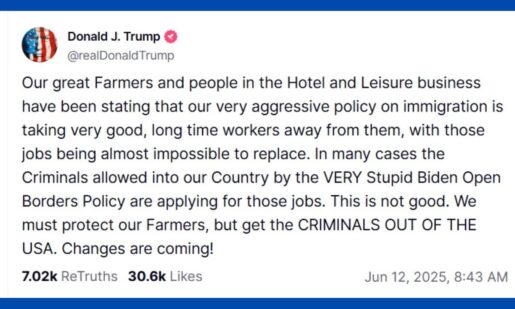President Donald Trump said he plans to change course on his immigration crackdown to protect industries like agriculture and hospitality— sectors that rely heavily on migrant labor.
In a June 12 Truth Social post, Trump acknowledged that his administration’s aggressive deportation efforts have disrupted farm and hospitality operations by removing longtime workers.
But the debate over illegal immigration and farm labor has long included voices from the labor movement, some of which contradict current political orthodoxies on both sides of the aisle. Cesar Chavez, the late civil rights leader and founder of the United Farm Workers (UFW), was among the most vocal opponents of illegal immigration during his lifetime, citing its effects on farm labor.
In the 1970s, Chavez launched what was known as the “Illegals Campaign,” aimed at stopping the hiring of undocumented workers. His cousin, Manuel Chavez, led a controversial border patrol-style operation that, at its peak, involved hundreds of people and cost the UFW $80,000 a week. People aligned with the Illegals Campaign would not only call immigration officials on illegal immigrant workers, but they would reportedly threaten and beat illegal aliens, too, if they felt it was necessary.
In a 1974 interview, Chavez accused agricultural interests of using undocumented immigrants to break strikes and undermine union power. “We estimate that 60 to 70 percent of the farmworkers in California—of the resident workers—are out of the job because of the wetbacks,” he said. He further alleged that some immigration checkpoints were being left “unmanned” intentionally, suggesting the federal government was complicit in strikebreaking.
While Chavez’s legacy is often associated with nonviolence and civil rights, his views on immigration were shaped by the belief that an influx of illegal labor undercut wages and working conditions for farmworkers. “All of a sudden yesterday morning, they brought in 220 wetbacks—these are the illegals from Mexico,” he told KQED in the 1970s. “There’s no way to defend against that kind of strikebreaking.”
Today, approximately 42% of U.S. crop farmworkers between 2020 and 2022 lacked legal status, according to the Department of Agriculture.
Trump’s recent immigration crackdown has drawn criticism from Democrats, who argue it harms the very workers who keep key sectors of the economy functioning. “Immigrants are essential to the backbone of our economy,” Sen. Cory Booker (D-N.J.) posted on X. “Mass deportations and cruel policies against hardworking families don’t make us safer or stronger—they weaken us.”
In a video shared alongside Booker’s post, a woman defends illegal immigrants’ role in the agricultural workforce, claiming they dominate roles that “you do not” and noting that such jobs have “no pay.” The video does not address whether illegal immigration contributes to wage suppression in the sector.
The woman speaking in the video does not recognize that Americans frequently do agricultural labor and that many cherished institutions are built around it. Texas alone has more than 1,000 FFA (Future Farmers of America) chapters and over 65,000 4-H members. The A in Texas A&M stands for Agriculture and remains one of the country’s leading institutions in the field.
In the last five years, there has been a surge of interest among adults in homesteading and other forms of agrarian living.
Chavez’s views were the traditional views of the broader labor movement. Until the early 2000s, the AFL-CIO—the largest federation of unions in the country—opposed illegal immigration on the grounds that it undercut labor standards and made organizing more difficult. While a few unions, such as the United Brotherhood of Carpenters, still appear to be more oriented toward the traditional immigration position of labor unions, entries on the UFW website try to minimize the former leaders’ beliefs.
In an early morning raid, ICE agents are seen chasing farmworkers through an Oxnard field. The raids coming as the federal gov't ramps up immigration enforcement in SoCal. Continuing coverage of the ICE raids, protests and unrest – Tonight at 11 from ABC7. https://t.co/bSJpCk8byb pic.twitter.com/oQQismAu2j
— ABC7 Eyewitness News (@ABC7) June 11, 2025
ICE deportation efforts have recently intensified, with daily arrest quotas tripling from 1,000 to 3,000. A viral video published by ABC News on June 11 showed ICE agents chasing a farmworker in Ventura County, California. In San Diego, immigration agents raided a popular Italian restaurant. White House officials defended these actions, maintaining that any unlawful presence in the country is grounds for removal.
Trump’s remarks come amid a sharp drop in migrant crossings at the southern border. Border Patrol reported fewer than 10,000 monthly encounters, down from more than 100,000 the year prior. Administration officials touted around 150,000 deportations in Trump’s first 100 days of his second term, The Dallas Express reported.
At the time, the Trump administration pressers were saying that he supported “DEI [Deport Every Illegal].”
Though Trump has not offered details on his proposed policy changes, the contrast between his current position, his former position, and the hardline stance once taken by Cesar Chavez adds a historical wrinkle to a modern political flashpoint.



